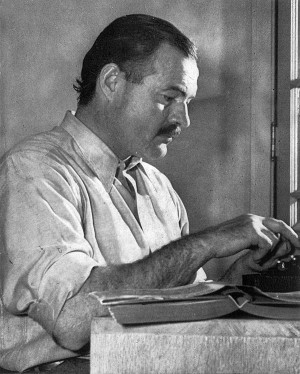
Ernest Hemingway
Hawaii. The crash of waves. The pound of surf against the beach and the black volcanic rock that lifts this hotel, this land, and the people of Kaua’i out of the Pacific Ocean. Why am I thinking of my idol, my long-departed mentor, my comrade-in-words who died of a self-inflicted shotgun blast in 1961, when I was only six years old and just beginning to understand the power of the written word? I have no earthly idea. But I am.
The sky here at far western the edge of America is hazy blue, dotted with veinous, thin clouds of greyish white. A child screams somewhere below the space my wife and our friends the McVeans call our temporary home. Eight stories above the sand, the water, the barges entering the harbor at the end of thick steel cables attached to tugs, I sit and tap out words. I am compelled to this. I am destined to do this. And always, looking over my shoulder as I sit behind my MacBook Air, is Papa. For better or for worse, he is the writer I have, on my writerly journey, sought to emulate relative to style. Not lifestyle, you understand: literary style.
Ernest was, to be sure, a misogynist. I do not seek, in my attempts to craft the great American novel (or one solid, memorable short story that will live on after I am gone) to re-create Ernest’s loathing for women. That’s right. Ernest, in my humble view, loathed women. Oh, he loved sex. That seems patently obvious by the fact he was married four times and that, in between the rocky reefs that each of those marriages floundered, he bedded other women. Faceless, nameless, egoless women. Tokens played in the slot machine of life, at least as the gentler sex is portrayed in the master’s prose. If I have one thing over Ernest in the writing department it’s that (at least this is my hope; for self-criticism is always an iffy game) I view women as superior, not inferior, to men in many respects. Honesty. Loyalty. Level-headedness are all generic attributes I’d attach to the feminine gender. Characteristics that most men, including me, lack when push comes to shove. Anyway, here I sit, listening to feral roosters crow (a hurricane busted chickens out of their pens in the early ’90s and now the entire island of Kaua’i is overrun with their offspring), waves slapping silica, and the occasional cry of a beach volleyball player who has bested his or her foe at the net, all the while thinking of Hemingway.
I’m not sure why. I mean, this isn’t Papa’s ocean. The author’s water was the blue green warmth of the Caribbean, an entire continent to the east. His islands were not these islands but instead the Keys of Florida and pre-Castro Cuba, where American machismo, money, power, and prestige reigned supreme until a little man in a fatigue cap upset paradise. And yet. The blue water outside the harbor breakwater is part of the same vast plain of salt water that tickles all of the islands of the world save for those puny excuses, those little slashes of landfall, that disturb inland lakes and landlocked seas. Perhaps the surf and the gulls and the wind, especially the night breeze, which massages Rene’ and I while we sleep in our comfortable resort bed with the sliding doors open to the ocean, is enough to evoke the ghost of my mentor. But why? Why waste my time, my precious vacation moments, considering a writer who, in the end, cut his life and his muse short? I have no wish to emulate the tragedy of his familial life or his end game. No, unlike Ernest and another great writer, Dylan Thomas, I will likely, at some point, “go gently into that good night”. I have grandchildren (oodles of them I expect: we have four sons) to look forward to. There will be, I am certain, many more nights like last night, sitting with good friends in an outdoor bar, sipping Kona beer and eating flatbread, gazing at my wife. Ernest was a genius when it came to the succinct, the terse, and the economic ordering of words on a page. But he was a fool when it came to living. Yes, I know that’s a harsh indictment of a man who suffered from a mental illness. But in moments of lucidity, Ernest made choices. He made decisions that led a great and talented writer to leave behind those he loved and those who loved him. Ernest Hemingway walked in the world, reveled in the world, but never loved the world. I won’t make that same mistake, regardless of how well or how poorly my writing is received.
Hear the surf? It’s whispering to us, telling us that tomorrow will be a very good day.
Peace.
Mark


